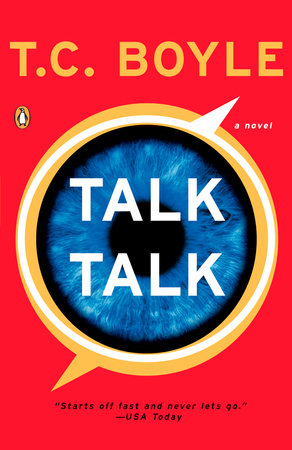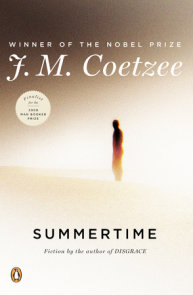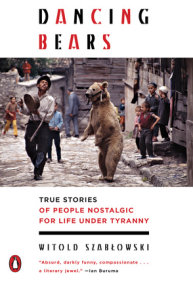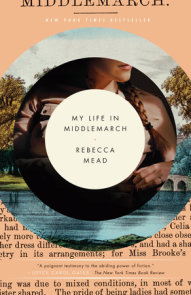READERS GUIDE
Questions and Topics for Discussion
INTRODUCTION
Readers of T. C. Boyle’s The Tortilla Curtain will recognize a familiar satiric target in his latest novel Talk Talk—the American dream. What better way to parody America’s ideology of self-reinvention, a vital component to the American dream, than with a story about identity theft? The subject also allows for Boyle to reexamine another bete noire, our culture’s crass consumerism, as well as address the anxieties of living in the information age, where one’s legal and financial identity is more vulnerable than ever before. But Talk Talk, while full of Boylesque humor, is not a satire at all. It is instead a book that reads with all the breathless, headlong pace of a thriller, while at the same time examining deeper questions of language and identity.
Talk Talk is centered on three main characters: Dana Halter, a deaf teacher of English literature; Bridger Martin, her boyfriend; and Peck Wilson, the career thief who steals Dana’s identity. The novel opens with Dana being pulled over for a routine traffic violation. A check on her driver’s license reveals Dana Halter to be a dangerous fugitive with a long rap sheet that includes auto theft and assault with a deadly weapon. Her identity has been stolen and, for the time being, she is powerless to prove it. After a weekend of incarceration, stripped of her rights, her clothes, and her dignity, Dana sees not only the idiocy of the justice system but also the fluid and fragile nature of identity. Prior to this episode her issues of selfhood dealt mainly with trying to pass for “normal” in a world of hearing. Now, viewed as “just another perp” by her jailors and cellmates, she is forced to restore her legal and financial identity, a process that will entail an intimate self-examination. Since the law enforcement agencies prove incapable or unwilling to apprehend the identity thief she decides to track him down herself.
Although aurally challenged, Dana has a mind for detective work. Her interest in the etymological roots of words (e.g. “disrespect” in the slang word “dis”) mirrors her search for the base identifier (in this case, the true name) of her assailant. Yet, at her journey’s end she discovers much more than the thief’s identity.
Bridger Martin, Dana’s boyfriend, joins her on this cross-country search for her criminal double. Issues of self-identity also plague Bridger. He spends most of his time working at a special-effects company under the alias of “Sharper.” His imagination and sense of reality is informed with the products of popular visual culture—film, TV, video games. When he learns of Dana’s incarceration he immediately conjures up stock scenes of prison films, such as slop being fed to prisoners out of a bucket. (Dana is actually fed bologna sandwiches.) Reality eventually confronts Bridger in the form of a real emotion—hate—upon seeing the face of Dana’s assailant for the first time. Suddenly, as Boyle suggestively phrases it, “the film has slipped off the reel.” The dangerous journey he takes also forces Bridger to confront real violence, not the celluloid kind to which he is accustomed. It is an experience that leaves him quite literally speechless.
Finally, there is William Peck Wilson, Dana’s assailant. Ever since he served a prison sentence for assaulting his ex-wife’s boyfriend, Peck has been a criminal, assuming so many identities it is hard for him to keep track of who he is at a given moment—Peck Wilson, Frank Calabrese, Dana Halter, Bridger Martin. His motto, taken from his prison mentor Sandman, is a corruption of the Army recruiting slogan (“Be anybody you can be”). As “Dana,” he resides in a lavish condo in Marin County with his sexy, if naïve, Russian girlfriend, Natalia, and her daughter, Madison. When he’s not devising new ways to pay for this lifestyle, he spends his time cultivating the refined tastes and sensibilities of the upper class. However, his California dream comes to an abrupt end when Dana and Bridger arrive at his home, forcing Peck to flee back east, where Sandman has secured him a stately house on the Hudson River, not far from the town he grew up in. His journey east mimics Dana’s as they both prepare to confront their mothers (Dana’s mother also lives in New York) and their past lives, with startlingly different results. For Dana, she learns to accept her deafness as her base identifier. For Peck, while recalling the life he had as a restaurant owner, husband, and father to his only daughter, Sukie, he painfully realizes the only identity he longs to (re)possess is that of fatherhood. Sadly, this identity has been irrevocably lost to him.
ABOUT T.C. BOYLE
T. C. Boyle is the author of eleven novels, including World’s End (winner of the PEN/Faulkner Award), Drop City (a New York Times bestseller and finalist for the National Book Award), and The Inner Circle. His stories regularly appear in The New Yorker, GQ, The Paris Review, Playboy, and Esquire. A five-time recipient of the O. Henry Award, he holds a Ph.D. in literature from the University of Iowa and an MFA from the University of Iowa Writers’ Workshop. Since 1978, he has taught in the English department at the University of Southern California.
A CONVERSATION WITH T.C. BOYLE
Q. Talk Talk is your first foray into thriller fiction. What attracted you to the genre? Do you have any plans on returning to it in the future?
A. I do not consider this “thriller fiction,” but rather just a thrilling read, like many of my stories and novels—the designation, I think, limits the reader’s expectations. Novels like Drop City and A Friend of the Earth are equally thrilling, as are many of my short stories, such as “Termination Dust” and “Killing Babies,” to name just a few. To my mind, the term “thriller” applies to books that focus on one level only—that of plot—while Talk Talk provides a rich subtext probing the question of what our identity is and how we know ourselves through language. It may be interesting to note that while most critics here saw The Tortilla Curtain as a socio-political novel, a number of critics in England called it a thriller. Amazing, no? It just goes to show you how limiting such designations can be.
Q. If I am not mistaken, Talk Talk is your first novel since World’s End set substantially in Westchester County, New York. Was there a particular reason you chose to return to the region of your upbringing for this novel?
A. Many of the characters in my novels and short stories hail from Peterskill, the fictional town I’ve created as a stand in for Peekskill (on the Hudson), where I was born and raised. Peterskill remains at the heart of my fiction, no matter where the stories take me, and I find comfort in returning to it whenever I can. Peck Wilson, like Tyrone Tierwater of A Friend of the Earth—like me—is a stranger in a strange land out here on the West Coast. No matter how long I live in California or how closely I am identified with its society and landscape, I will always see it slightly askew—that is, from the perspective of an Easterner, born and bred. I like the tension this slight disassociation lends to my work.
Q. As some critics have remarked, in its satire of the American dream Talk Talk shares much with your novel The Tortilla Curtain, first published in 1995. Has your opinion of the American dream changed since you wrote The Tortilla Curtain? Do you think the dream has changed?
A. What, exactly, is the American Dream and how do you prove it has come true (or failed) in your own life? I am a product of this dream, if you take it to mean that in a democracy such as ours social mobility is possible, that if you work hard enough and have the talent and education, you can succeed at what you put your mind to. All well and good. But for many—immigrants, especially, but also native-born Americans like Peck Wilson—the outward show of prosperity is all that matters. We are sold product from the day we are born till the day we die and the majority of ads imply that without one shining new thing or another we are somehow lesser people and woefully unfulfilled. It is easy to mistake the object for the reality. Dana’s dream, like Peck’s, is to be accepted in the larger society—or not simply accepted, but admired. And yet she goes about it in the old-fashioned way, working compulsively to overcome her difference and succeed on her own terms. Peck, with his narcissistic (sociopathic) personality, sees no reason to bother, when the fruit is there for the picking and the show is all.
Q. The ending of Talk Talk clearly upsets the conventions of thriller fiction. Why did you choose to create, then frustrate, that desire for revenge that runs through the novel?
A. Well, of course, for one thing I do not adhere to convention—I want always to surprise myself and, by extension, my readers. I do think, however, that some readers, in the mad, page-turning rush of this novel—breathing hard, ignoring the telephone—might just miss the subtlety and appropriateness of the ending of the Dana/Peck story. If this is a book that explores what it is to identify oneself—through language, as Dana does in a different way from hearing people and that Victor, the wild child, is never able to do—then it may be significant to think about the fact that the ending builds to the only moment of verbal communication between the antagonists. What do you want? Yes, and you can almost hear the waters rushing into that gulf. How could anyone put it into words?
Q. A question about the novel’s literary forebears. William Peck Wilson, the novel’s villain and double, is an allusion to Poe. Dana’s reciting of Poe’s “Annabel Lee” (the name of a character in Nabokov’s Lolita) then connects it to Lolita, another detective road novel, as it were, involving a doppelganger. Finally, Bridger Martin seems to reflect the eponymous hero of William Golding’s Pincher Martin, a character like Bridger with a skewed sense of reality. Could you talk briefly about these or any other literary works that influenced the writing of the novel?
A. Nice observation. Yes, I was, of course, referring to Poe’s doppelganger story and did have Nabokov’s Lolita in mind to a certain degree—not totally, but rather for its playfulness (which will be reflected much more fully in my next novel) and the fact that it is a classic American road novel, as you’ve stated.
Q.Your portrayal of Dana’s condition is very convincing. How much research did you conduct beforehand? Have you received any feedback from the deaf community about the book?
A. Once I discovered that Dana would be deaf, the whole book opened up for me in the way I’ve discussed above: we are our language and Dana’s language is very different from ours, a visuo-spatial language rather than an auditory one, and so she is more protective of her identity even than we might be. I had the great good fortune to be able to go to Gallaudet University in Washington, D.C., and meet with the students there while writing this book. I was also assisted by a friend who went deaf later in life and who has become an advocate of cochlear implants. I have indeed heard (listen to the prejudicial verb) from several people in the deaf community who felt that my portrayal was accurate and that it brought out some of their own feelings on the issue of their difference.
Q. Like Ned Rise in your early novel Water Music, Peck Wilson is a talented, resourceful, and lawless entrepreneur. Could you share your observations about the novelistic appeal of such characters? What is it that draws you to personae like these?
A. I am fascinated by this sort of personality. It is the same personality most novelists are saddled with, as were the real-life figures upon whom I’ve based past novels, Dr. Alfred C. Kinsey (The Inner Circle) and John Harvey Kellogg (The Road to Wellville). This is a personality type—narcissistic—which can help one focus on a given project in a very positive and compelling way, but which also, at its worst, does not allow empathy for anyone. That is, such figures, whether they be gurus, politicians, preachers or what have you, gather people to them only in pursuit of their own agenda. They cannot see any point of view but their own (and the ability to use point of view is what saves novelists from entering the realm of the casually evil, like Peck). What I like about Peck is his obliviousness. He doesn’t see himself as a bad guy, but rather just someone atop the Darwinian heap and fully welcome to all society’s rewards.
Q. Have the movie rights have been optioned for Talk Talk? You’ve seen at least one film adaptation before with The Road to Wellville. Does the idea of another film adaptation of one of your books fill you with excitement or trepidation?
A. Excitement, mais oui! All that color, that movement, the music, those faces!
I am happy to report that the movie rights were sold before the book was released. Universal Pictures has assigned a director, Gary Fleder, who has made several intriguing and fast-paced films (dare I call them thrillers without damning myself?) in the past. Many short films have been made of my work, with mixed results, and one major Hollywood film, The Road to Wellville, which I loved. I still think it’s one of the funniest movies ever made, very nearly ascending to the great height of The Big Lebowski, the apex of all funny movies. There are a number of films based on my stories and novels in the works, which I try to keep updated on tcboyle.com for any who may be interested.
Since I don’t participate in film work in any way—my job is to create fiction on the page and if I had nineteen lifetimes I don’t think I would ever get enough of it— I simply trust to the filmmakers and hope for the best.
Q. What are you working on now?
A. As I mentioned above, Nabokov has influenced my latest, especially his magical Pale Fire. As of this writing—in June of 2007—I am nearly finished with this book, another historical setting built around another of my egomaniacal (yes, and quintessentially narcissistic) real-life heroes, Frank Lloyd Wright. The book is called The Women, and it is written for the most part from the points of view of the four principal women in the architect’s life, as filtered, in a Nabokovian way, through a narrator who provides introductions to each of the three sections and a footnoted commentary throughout. He is an invented character named Tadashi Sato, who, in my telling, was one of Wright’s apprentices at Taliesin in the 1930s. I’m enjoying the opportunity to revisit Japanese culture, which I haven’t explored since 1990’s East Is East, and, with good conscience, eating plenty of sushi (or maybe with bad conscience, considering the global-warming and mass-extinction revelations of A Friend of the Earth). I should say too that the book is very, very funny, albeit necessarily tragic in the end.
DISCUSSION QUESTIONS




















